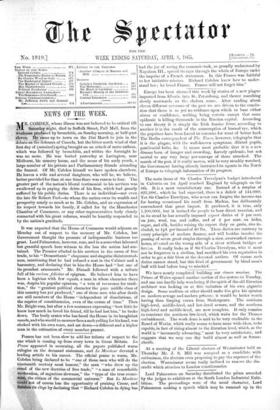It was expected that the House of Commons would adjourn
on Monday out of respect to the memory of Mr. Cobden, but Government thought the pressure of indispensable business too great. Lord Palmerston, however, rose, and in a somewhat laboured but graceful speech bore witness to the loss the nation had sus- tained. The Premier alluded to his services in the cause of free trade, to his " Demosthenic " eloquence and singular disinterested. mess, mentioning that he had refused a seat in the Cabinet and a baronetcy, and declaring that in him the House had " lost one of its proudest ornaments." Mr. Disraeli followed with a tribute full of his curiosa felicitas of epigram. He believed him to have been a logician with few equals, a man in whose character there was, despite his popular opinions, " a vein of reverence for tradi- tion," the " greatest political character the pure middle class of this country has yet produced," one of those men who after death are still members of the House "independent of dissolutions, of the caprice of constituencies, even of the course of time." Then Mr. Bright rose, but after a few sentences expressing " how little he knew how much he loved his friend, till he had lost him," he broke down. The burly orator who has faced the House in its haughtiest moods, and who would to-morrow face a mob yelling for his head, was choked with his own tears, and sat down—a different and a higher man in the estimation of every member present.






























